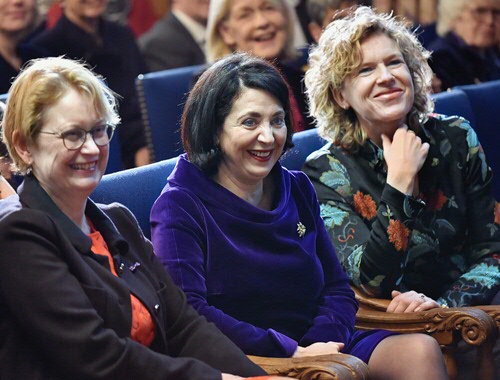Leaders in times of corona

The world is in crisis. We are all under pressure, and our leaders are no exception. Janka Stoker is Professor of Leadership and Organizational Change and co-director of the Centre of Expertise ‘In the LEAD’ of the Faculty of Economics and Business. This Centre conducts research into the efficacy of leadership and gives customized advice to organizations and professionals. A discussion of leadership in times of the coronavirus.
Martin Althof, Communication UG
We are facing a pandemic. What have you noticed about the way that world leaders are responding to this crisis?
As in so many other situations, leaders respond differently. You see it in the speed with which they impose strict (or less strict) measures, for example. The way in which they give press conferences or address the people via the media also differs greatly. However, I have also noticed that their style is often in keeping with the way they act under ‘normal’ circumstances. Angela Merkel is as calm and analytical as ever, explaining exactly why she has decided to impose certain measures. And Rutte is leading our country through the crisis in his own way. His speeches are more pragmatic than those of Macron, for example, who is more inclined to use dramatic statements such as ‘we are at war’.
To what degree is the style of leadership dictated by the political system and the culture of a country?
In less democratic countries, China for instance, the information that is provided (about the number of deaths, for example) and the communication from leaders is far less transparent, and journalists have less freedom to report. You also see some leaders ‘using’ the situation to their own advantage. Take the Hungarian prime minister Orban, who has imposed a state of emergency without a time limit, thereby side-lining parliament. A previous study carried out by ‘In the LEAD’ showed that threat and crisis lead to directive leadership, whereby leaders keep their staff under strict control and tell them exactly what to do. This was the case during the bank crises in 2008 and during and after Brexit.
Why do threat and crisis inspire directive leadership?
This can be explained using the so-called ‘threat-rigidity’ hypothesis, which states that people, and organizations, respond to threat by becoming rigid. As a result of the threat, decisions are made centrally, with greater control. This is a very human reaction under the circumstances. We also discovered that the gravity of the crisis makes a difference: the managers in companies operating in industry, the sector that is usually the hardest hit by a financial crisis, become much more directive. Culture makes a difference too. We found that the ‘power distance’, the level of inequality that exists (and is perceived) between the people with and those without power, has a huge effect. In countries with a large power distance, such as Malaysia, Saudi Arabia and China, directive leadership increased more after a financial crisis than in countries such as Denmark or the Netherlands.
A lot of people have regularly warned us about the dangers of a pandemic, including Bill Gates. Are good leaders prepared for extreme crises? Should they be?
It’s very easy to say that good leaders should always be prepared for extreme crises, but also somewhat gratuitous. Ultimately, resources (such as money and people) are always limited. But the main point is that systems within a country should be built to cope with problems like this if they arise: a good healthcare system, a good education system, a good social-economic system. Strong systems make a country resilient. These are political choices; they are made by individual countries and their electorates. Are you prepared to pay more tax for healthcare, social security, education? Leaders are obviously the ones who can make a difference once a crisis kicks in, by responding swiftly and organizing and utilizing the right expertise. The way they communicate is equally important, as is their own behaviour.

So bearing this in mind, how would you judge the leadership displayed by the American President Donald Trump?
Leaders must be consistent and serve as models if they want people to trust them, particularly in periods of change. Donald Trump, who encourages citizens to wear face masks during a press conference and immediately says that he does not intend to do so, is a prime example of how not to do it.
You make a distinction between transformational and transactional leadership. Mark Rutte is an example of the latter style. Should Rutte perhaps show a more transformational style of leadership now?
Research has shown that transformational leadership, a style of leadership that is characterized by an inspirational vision, is effective when change is required. But it is not true that transactional leadership, which is characterized by directing others on the basis of formal agreements, is necessarily ineffective. This depends very much on the context. A lack of transformational leadership has never been an obstacle to Mark Rutte’s highly successful political career. In fact, his popularity as a leader has increased during the present crisis. You often see this in times of crisis: our need for strong leadership grows, as does our appreciation for, and our trust in, our leaders. This phenomenon is known as the ‘rally round the flag’ effect in political sciences: during a serious crisis, citizens unite behind their leaders.
Which lasting effects will this deep crisis have on the leaders of our country?
That is difficult to say. A health crisis on this scale is unprecedented. After the financial crisis in 2008, everyone agreed that things really had to change. But basically, things stayed very much the same. In my lectures, I cite an appeal made by 74 top Dutch leaders in November 2008. They were calling for more women to be appointed to top positions, because the time was supposedly ripe. It had very little effect. But of course this crisis might be different – whatever else happens, we researchers will spend the next few years studying it!
More information
- Janka Stoker
- In the Lead, leadership expertise center
More news
-
10 February 2026
‘Regeneration starts where courage meets imagination’
-
09 December 2025
Are robots the solution?
